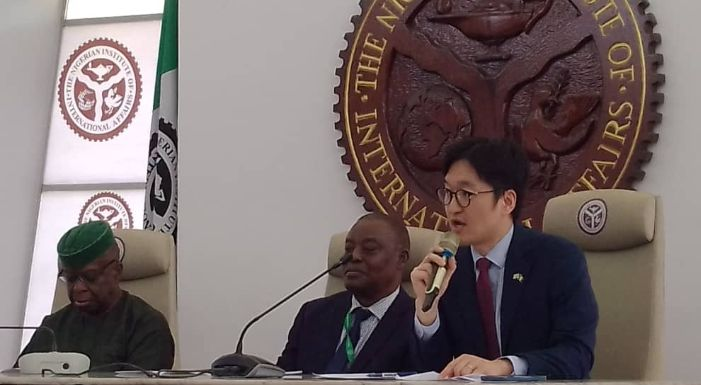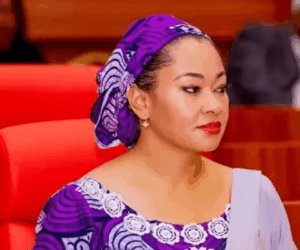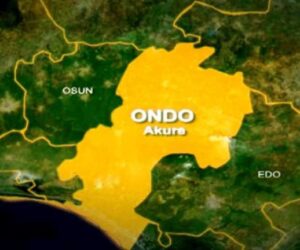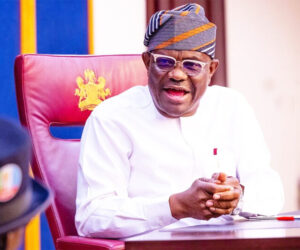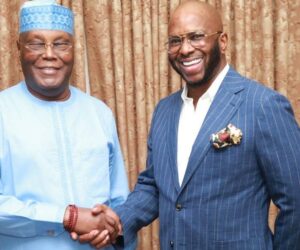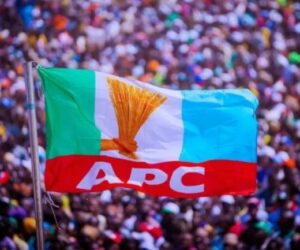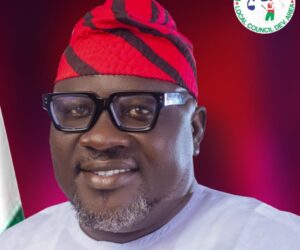2
Charge d’affaires, Embassy of the People’s Republic of Korea, Mr. Tak Namgung, has assured of Korea’s readiness to partner Nigeria for economic growth.
Tak gave the assurance at the Nigerian Institute of International Affairs (NIIA) Joint Seminar
titled: “Africa’s Rising Global Influence,”
organised by the institute and the Republic of Korea in Victoria Island, Lagos, on Thursday.
While affirming Korea’s preparedness to contribute to Nigeria’s growth,Tak said: “Korea’s long experience shows that economic growth and social stability, along with security, must advance together if progress is to be made. And we are also mindful that peace and safety remain vital for Nigeria’s continued success. And Korea stands ready to cooperate wherever, to contribute to a more secure and prosperous environment.”
“And as our title suggests, Africa’s global influence is only once in a lifetime. But the challenge and the opportunity is to make that influence lasting and sustainable. And Korea is willing to help with that,” the envoy added.
Tak, who affirmed that Nigeria and South Korea share the same belief in opening a new chapter of business investments, said: “And that’s why I’m seriously thinking that Korean Investments and with the strong legal institution in Nigeria will, in the long run, lead to more prosperity in Nigeria.”
The envoy, who noted that investment in education and other sectors contributed to Korea’s growth, said: “We also lacked natural resources, but we had a national planning, investment in education, and social mobilization. And they helped Korea become a high-income and innovative economy.
“And, we have social security through education, decent jobs, and health care. Those reduce social fragility and promote life and peace. And while military security lies beyond this session, it also remains a crucial part of the growth of development, as you see in some cases,” he added.
While noting that the trade level between Nigeria and South Korea “might seem low compared to other countries,” Tak assured: “But what I’d like to say is that investment can actually lead to more trade volumes.
“So that’s why I have been focusing more on bringing Korean investments here in Nigeria. And once we have a factory and we have evaluated something that can lead to a mutual beneficial way in terms of trade, it will, of course, easily lead to higher trade volumes.”
Speaking at the event, Director General, NIIA, Prof. Eghosa Osaghae, commended South Korea for moving from the status of “an agrarian (subsistence-based economy, basically non-industrialised,) to a country that is not only industrialised, but one of the world’s trillions of economies.
Citing the South Korean experience and how it was able to surmount its obstacles and challenges, Prof. Osaghae said: “But I think what South Korea has done very abundantly shows is that it is possible, and that we identify them as major obstacles to our growth and progress.
“Now, South Korea has the pivotal state approach to development, meaning that the state does not disappear, but the state then becomes an enabling force for the private sector. And so, you go all over the world, you see the South Korean companies, what they are all doing is following state inroads and openings.”
While hailing South Korea for partnership to transform Africa, the NIIA DG said: “South Korea has done this in Rwanda, showing what state-private sector partnership can actually do. And it’s a model that they are gradually transferring to Rwanda, that the ICT sector in Rwanda is state-led, but is private sector-driven. So that’s a very strong partnership.”
The DG, who commended the Asian country’s transformation model, said: “South Korea also had a village-to-town model, which involved a comprehensive rebuilding of the rural areas through modernisation and great urbanisation. So that is also something that we can learn from. But I think the most important of them all is that South Korea had something you might want to call a home-grown technological base.”
Stressing the need for partnership between the two countries for technology transfer, Prof. Osaghae added: “And that’s the thing that needs to be transferred. So for Nigeria, for instance, in the agri-sector, in the industrial sector, in the manufacturing and all of those things, we need greater partnership.
“And that’s why I was saying that the time has come, because we have also shown our abilities in critical areas.
“We invite South Korean investors and so on. But we also have African and Nigerian investors going the other way also to South Korea. The final point I want to make this time is that South Korea has always identified key points of its national policy.”

